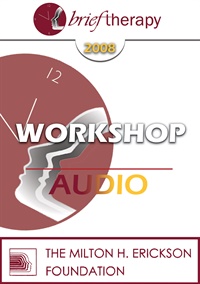BT08 Workshop 36 - Transtheoretical Therapy with Clients at Each Stage of Change - James Prochaska, PhD
- Average Rating:
- Not yet rated
- Topic Areas:
- Workshops | Borderline | Brief Therapy | Personality Disorders
- Categories:
- Brief Therapy Conference | Brief Therapy Conference 2008
- Faculty:
- James Prochaska, PhD
- Duration:
- 2:41:36
- Format:
- Audio Only
- Original Program Date:
- Dec 12, 2008
- License:
- Never Expires.
Description
Description:
Overcoming Chronic Problems involves progress through six stages of change: pre-contemplation, contemplation, preparation, action, maintenance and termination. Therapeutic principles and processes need to be matched to each stage of change. Innovative interventions for applying these principles and processes will be presented along with evidence and examples of how stage-matched therapy can outperform brief action-oriented therapies.
Educational Objectives:
- To list the six stages of change used in overcoming chronic problems.
- To describe how stage-matched therapy can out-perform brief action-based therapies. Brief Treatment with the Borderline Personality.
*Sessions may be edited for content and to preserve confidentiality*
Credits
Faculty

James Prochaska, PhD Related Seminars and Products
JAMES PROCHASKA, PhD, is Director of Cancer Prevention Research Center and Professor of Clinical and Health Psychology at the University of Rhode Island. He is author of over 300 publications, including three books: Changing for Good; Systems of Psychotherapy; and The Transtheoretical Approach. He is internationally recognized for his work as a developer of the stage model of behavior change. He is principal investigator on over $60 million dollars in research grants for the prevention of cancer and other chronic diseases. Dr. Prochaska has won numerous awards, including the Top Five Most Cited Authors in Psychology from the American Psychology Society; an Innovator's Award from the Robert Wood Johnson Foundation; and is the first psychologist to win a Medal of Honor for Clinical Research from the American Cancer Society.


